Psychology and the Origins of Western Marxism
In the first decades of the twentieth century and ‘new psychology’, influenced principally by William James, Gustav Le Bon, Henri Bergson, and Sigmund Freud, did much to challenge the rationalist presupposition of ‘Second International Socialism’. When the German socialist Eduard Bernstein (1850-1932) opened the famous ‘revisionist controversy’, he explicitly drew upon the literature of ‘mob psychology’ to criticise what he took to be the socialist ‘cult’ of the masses. The working-class, he argued, was essentially an irrational ‘herd animal’. Bernstein drew the depressing conclusion that a socialist party could only legitimately put forward demands acceptable the educated middle-class: ‘A demand which all bourgeois parties would necessarily oppose on principle would, by that fact alone, be branded as utopian’.
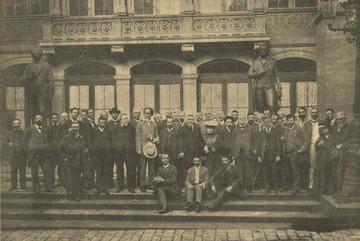
Delegates to the 1907 International Socialist Congress in Stuttgart, Germany (1907)
Georges Sorel (1847-1922) in his syndicalist phase agreed with Bernstein that the masses had the psychology of a ‘herd animal’ but drew radically different conclusions. While sceptical about the practical efficacy of a revolutionary general strike, he strongly favoured it as a ‘myth ideally suited to proletarian psychology’. Revolutionaries should aim to mobilise ‘a body of images which, by intuition alone…is capable of evoking as an undivided whole the mass of sentiments which correspond to…the war undertaken by Socialism against modern society’. This would keep proletarian psychology free of bourgeois contamination.
Rosa Luxemburg (1871-1919) objected to such syndicalism on the grounds that ‘with the psychology of a trade unionist…neither socialism nor the mass strike can be made’. The class condition of the proletariat, however, was such that a socialist class conscious was always ‘latent’ and spontaneous mass strike militancy an ‘instinctive’ potentiality. It was the role of the party to monitor the mood of the working class and to keep an eye out for the spontaneous upsurge. In the meantime, in order to keep itself limber for the opportunity, it had to fight ‘uncritical trade-union optimism’ and ‘uncritical parliamentary optimism’ equally.
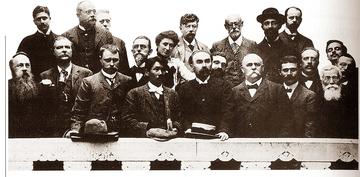
Rosa Luxemburg (centre) among leaders at the International Socialist Congress, Amsterdam (1904).
In 1921, just as the European revolutionary wave that had surged from 1917 petered out, the Russian Bolshevik Nikolai Bukharin (1888-1938) produced his textbook, Historical Materialism: A System of Sociology. Here he defined social psychology as ‘the non-systematised or but little systematised feelings, thoughts and moods in a given society, class, group, profession, etc.’ They were the fundament of all consciousness and ‘ideologies’ were nothing more than ‘coagulated social psychology’.
Bukharin distinguished between narrow ‘trade psychology’ and ‘class psychology’. Trade psychology was the basis for conservative social democracy of the Bernstein mould and class psychology the basis for revolutionary communism. The division was not clear-cut, however. In practice, the working classes remained divided into groups and subgroups, and different psychologies commingled. ‘This inequality of the class’, he emphasised, ‘is the reason for the existence of the party’.
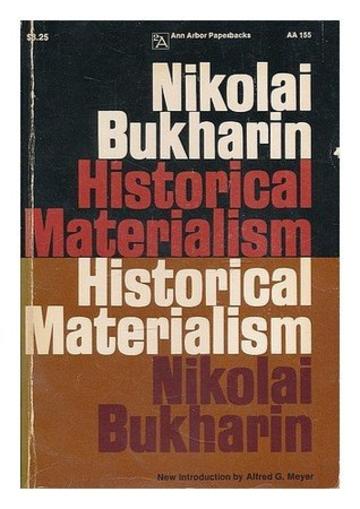
Nikolai Bukharin, 'Historical Materialism: A System of Sociology' (first published 1921)
It was the responsibility of the party, representing the advanced vanguard of the class, to provide leadership and keep the backward strata of the class from exercising too much political influence. In so doing, it did not passively reflect the psychology of the broad-based proletariat, but concentrated its best elements. ‘We naturally expect to find the entire class led by that section of it that is most advanced, best schooled, most united: the party’. But even the party itself lacks internal uniformity. It was for this reason that it required its own vanguard of individual leaders. This, of course, was a theoretical justification for the one-party state dominated by its self-perpetuating politburo.
György Lukács (1885-1971), the Hungarian Communist, was by no means happy with Bukharin’s book, which he described as ‘suspiciously close to…bourgeois materialism’. In particular, he objected to the idea that the party represented the most ‘psychologically sound’ section of the proletariat. He set out his argument in that seminal work of Western Marxism, History and Class Consciousness (1923).
Class-consciousness, in Lukács’ counter-intuitive definition, was neither identical with ‘the psychological consciousness of individual members of the proletariat, nor with the (mass-psychological) consciousness of the proletariat as a whole’. While it was true that adopting the standpoint of the proletariat allowed Marxists ‘to see society from the centre, as a coherent whole’, this was not the ‘inherent or natural’ psychological viewpoint of the working class itself. Proletarians were, in fact, bearers of ‘false consciousness’, ‘reified consciousness’, ‘unconsciousness’ or a socially imposed ‘second nature’.
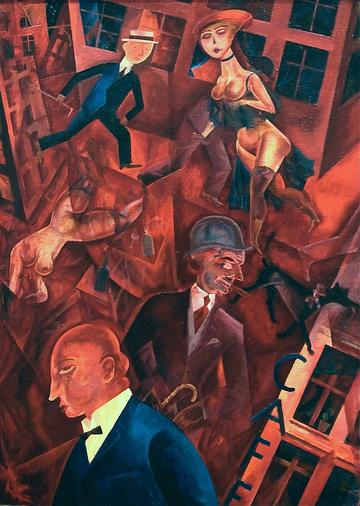
George Grosz, Metropolis (1917).
Following Luxemburg, Lukács argued that authentic class-consciousness on a mass basis only flickered into existence at times of acute crisis. Its natural tendency, however, was to remain ‘theoretical and latent’. Outside periods of sharp revolutionary escalation, it is the Marxist revolutionary party that infers or ‘imputes’ the appropriate consciousness to the class. The Communist Party was a Marxist replacement for ‘natural’ proletarian psychology, not an expression of any part of it. ‘The essence of scientific Marxism consists, then, in the realisation that the real motive forces of history are independent of man’s (psychological) consciousness of them’.
Italian Fascism, meanwhile, was appealing to the ‘herd instinct’ by replacing the Sorelian myth of class struggle with that of national rejuvenation. Socialists felt themselves retreating on a broad front for the first time and began to wonder whether perhaps working class psychology was not up to its historic task.
One book in particular summarised the new pessimism that pervaded the socialist movement. Henri de Man (1885-1953), who before the war had been on the semi-syndicalist left of Belgian social democracy, in 1927 published his Zur Psychologie des Sozialismus. De Man’s approach was recognisably a combination of Proudhon’s disdain for the crudity of the proletariat and Lassalle’s ambition to lead the ignorant worker movement with science. Both forbearers were mentioned frequently. De Man combined their perspectives with a Lamarckian evolutionism and psychology drawn from Sigmund Freud and Carl Jung.
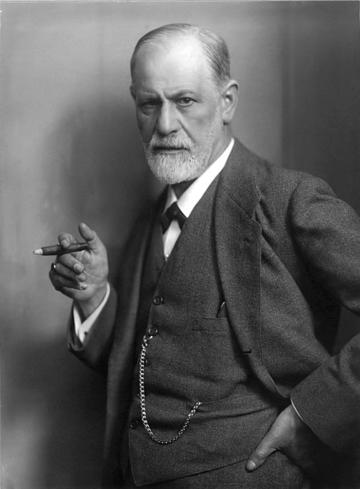
Sigmund Freud (c.1921).
At considerable length, de Man rejected what he took to be a reductive economic determinism in Marxism. It was important, he argued, to take full cognizance of the proletariat’s ‘inferiority complex’:
What characterises the proletarian is…the instability of his method of life; the insecurity of his employment; his dependence upon his employer; the fact that he can find no joy in the work; the absence of normal possibilities for higher education; his subjective social inferiority.
Marxist doctrinaires, ‘ignorant of psychology’, had failed to realise that proletarian were looking not to escape capitalist exploitation as such, but to find joy in work. De Man insisted that socialism could only emerge as a cultural rather than an economic revolution and that such a revolution could not rely upon proletarian psychology. ‘There can be no creation of culture without autonomy and responsibility; but the characteristics of proletarianised labour are dependence and irresponsibility.’ The historic role of the socialist movement had been to help the proletariat overcome its inferiority complex and to raise it from ‘demoralising social parasitism and a generalised criminology’. To go further, it was imperative to recruit bourgeois intellectuals en masse.
In many respects, this was a repetition of Bernstein, though with, though with an added charge of dark revivalism. It was perhaps a long path from here to the fascist idea of a people’s community, in which a natural elite ushers the proletariat into an integrated national community of joyful work, racial striving and Darwinian conflict. Nonetheless, it would be a path that de Man would take. During the Second World War he remained in Belgium to actively collaborate with the German New Order.
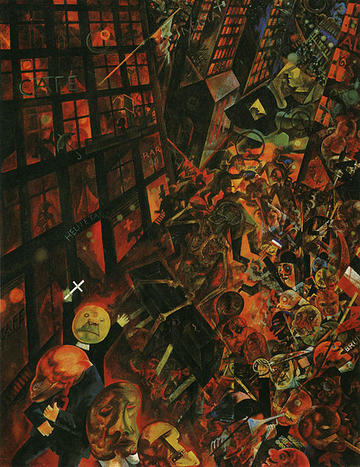
George Grosz, 1917-18, The Funeral (To Oskar Panizza).
From his Italian prison cell, Antonio Gramsci (1891-1937) criticised Bukharin’s work for failing to engage with the popular mind and seeking to reduce Marxism ‘to a form of sociology’. He was equally critical, however, of ‘the Freudianism of De Man’. Gramsci rebuked what he saw as De Man’s capitulation to ‘common sense’ but he admitted that ‘De Man does have one incidental merit: he demonstrates the need to study and develop the elements of popular psychology’. De Man may have failed to make any new discoveries, but he was right to raise the importance of investigating ‘the real feelings of groups and individuals and not those who are assumed on the basis of sociological laws’.
For Gramsci, it was the political party that mediated between diffuse folk psychology and political class-consciousness. Indeed, the party was effectively synonymous with the folk, both representing and energetically developing its class interests. ‘The subaltern classes, by definition, are not unified and cannot unite until they are able to become a “State”…only “permanent” victory breaks their subordination, and that not immediately’. In the meantime, a class can offer leadership or ‘hegemony’ through a leadership comprised of ‘organic intellectuals’. It had the role of making ‘coherent the principles and the problems raised for the masses in their practical activity, thus constituting [with them] a cultural and social bloc’. Party leadership would forge a ‘collective will’ through an ‘endless quantity of books, pamphlets, review and newspaper articles, conversations and oral debates, repeated countless times’. Repetition as Gramsci pointed out, was ‘the best didactic means for working on the popular mentality’. Communist revolution would create a state that at least could act as the ‘educator’ of mass psychology.
Psychology, never much made explicit in the original Marxist canon, ran through the thought of early Western Marxism. It took as a premise the irrational ‘herd mentality’ of the masses and drew the conclusion that only a vanguard party, and ultimately a state, could educate them to rationality. This elitism and culturalist orientation would persist through the Frankfurt School and ultimately inform the various forms of ‘social constructionism’ that have come to dominate much of the liberal academy. A positive and positivist view of ‘human nature’, arguably implicit in the original Marxist vision, was submerged from view. Soi disant liberal and radical thought is now much less about emancipating the human, and much more about setting her to rights.
Marc Mulholland is Professor of Modern History and Fellow at St Catherine’s College, Oxford.


